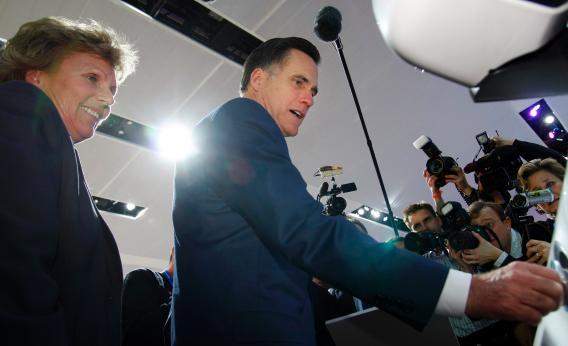The New York Times ran an odd story yesterday that piggybacked a critique of Mitt Romney’s media strategy onto a smart observation about the accounting device he employed during summer months in which he so fearsomely outpaced Barack Obama in the campaign-finance race. By employing “joint fundraising committees” shared with other Republican players—and being publicly hazy about exactly how the money was distributed—Romney has entered the fall with only limited authority over much of the money he has raised. As we learn more today about the candidates’ and parties’ finances, it looks as though Romney’s lack of advertising parity in August may be the least worrisome consequence of this structure.
Romney’s biggest problem is that more than one-half the money he has collected this spring and summer from his most generous donors is controlled by entities whose priorities may no longer align with his by election day. The campaign has been raising money into a Romney Victory account that allows donors to write one check for up to $75,800 that gets allocated among different committees—all of which are now working to further the nominee’s prospects. Only $5,000 of that goes to Romney’s own fund, while $30,800 goes to the Republican National Committee and $40,000 is divided among various battleground-state Republican parties.
As the Times noted, about $22 million of the RNC’s money can be spent in full coordination with Romney; basically the Boston campaign can directly order up ads from the party headquarters and specify what they should say and where they should appear. The rest of the committee’s money has to be spent on party-building activities not allocated exclusively for Romney’s benefit. “The fact that money is at the RNC significantly hobbles the Romney folk,” a former Federal Election Commission official explains to me. “This Victory money is going to have to be party things that benefit Romney incidentally.”
The money that has been assigned to state parties can’t be treated as Romney dollars, either. It is usually devoted to get-out-the-vote programs that benefit the entire ticket or use generic “vote Republican” ballot messages. Romney has effectively franchised his “ground game“—the operation of identifying and mobilizing individual voters—to such Victory programs. In other words, Romney’s ability to get out his vote is entirely dependent on the continued cooperation of party organizations.
The worst scenario for the Romney campaign would come if the national or state parties begin to see his candidacy as a lost cause, or decide to make congressional majorities—or gubernatorial, state row-office or legislative races—a priority instead. In 1996, Bob Dole’s campaign faced such a reckoning starting after his first debate against Bill Clinton failed to move the race in his favor, and party leaders redirected resources to protect Republican interests elsewhere. Romney is yet far from that point, but a cascade of further bad news and pessimistic polls could leave him quickly isolated.
“If the national party or the state parties make a decision that the presidential race is not working out, they can shift money down-ballot,” says a lawyer who has served as counsel to a presidential campaign. “Which the party has the right to do.”
Who Can Pull the Plug on the Romney Campaign?

Photograph by Bryan Mitchell/Getty Images.
Advertisement